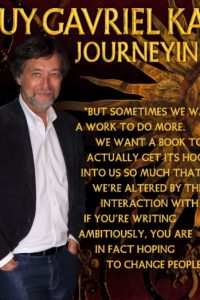The Year in Review 2021 by Graham Sleight
 As Locus’s statistics keep revealing, there’s so much SF and fantasy being published these days that any one person can’t keep track of everything. What I happen to have read in a given year is an emergent property of many things: whether I’ve enjoyed the author’s previous work, whether I’ve had a book recommended to me or seen it reviewed positively, what I happened to notice on a bookshop shelf – the list goes on. However, one thing’s clear to me, looking back at my list of titles read and enjoyed this year: many of the authors I found most interesting this year are younger than I’d have listed a decade ago. That may just be a function of what got published in 2021; but it also feels like SFF in the last few years has undergone one of its periodic generational transitions, and that a number of the authors doing the most vivid work are early in their careers. (I also seem to be reading more and more short fiction, but perhaps that’s just me.) Of course. my reading is only one datapoint, and I don’t know whether my Locus colleagues would say the same.
As Locus’s statistics keep revealing, there’s so much SF and fantasy being published these days that any one person can’t keep track of everything. What I happen to have read in a given year is an emergent property of many things: whether I’ve enjoyed the author’s previous work, whether I’ve had a book recommended to me or seen it reviewed positively, what I happened to notice on a bookshop shelf – the list goes on. However, one thing’s clear to me, looking back at my list of titles read and enjoyed this year: many of the authors I found most interesting this year are younger than I’d have listed a decade ago. That may just be a function of what got published in 2021; but it also feels like SFF in the last few years has undergone one of its periodic generational transitions, and that a number of the authors doing the most vivid work are early in their careers. (I also seem to be reading more and more short fiction, but perhaps that’s just me.) Of course. my reading is only one datapoint, and I don’t know whether my Locus colleagues would say the same.
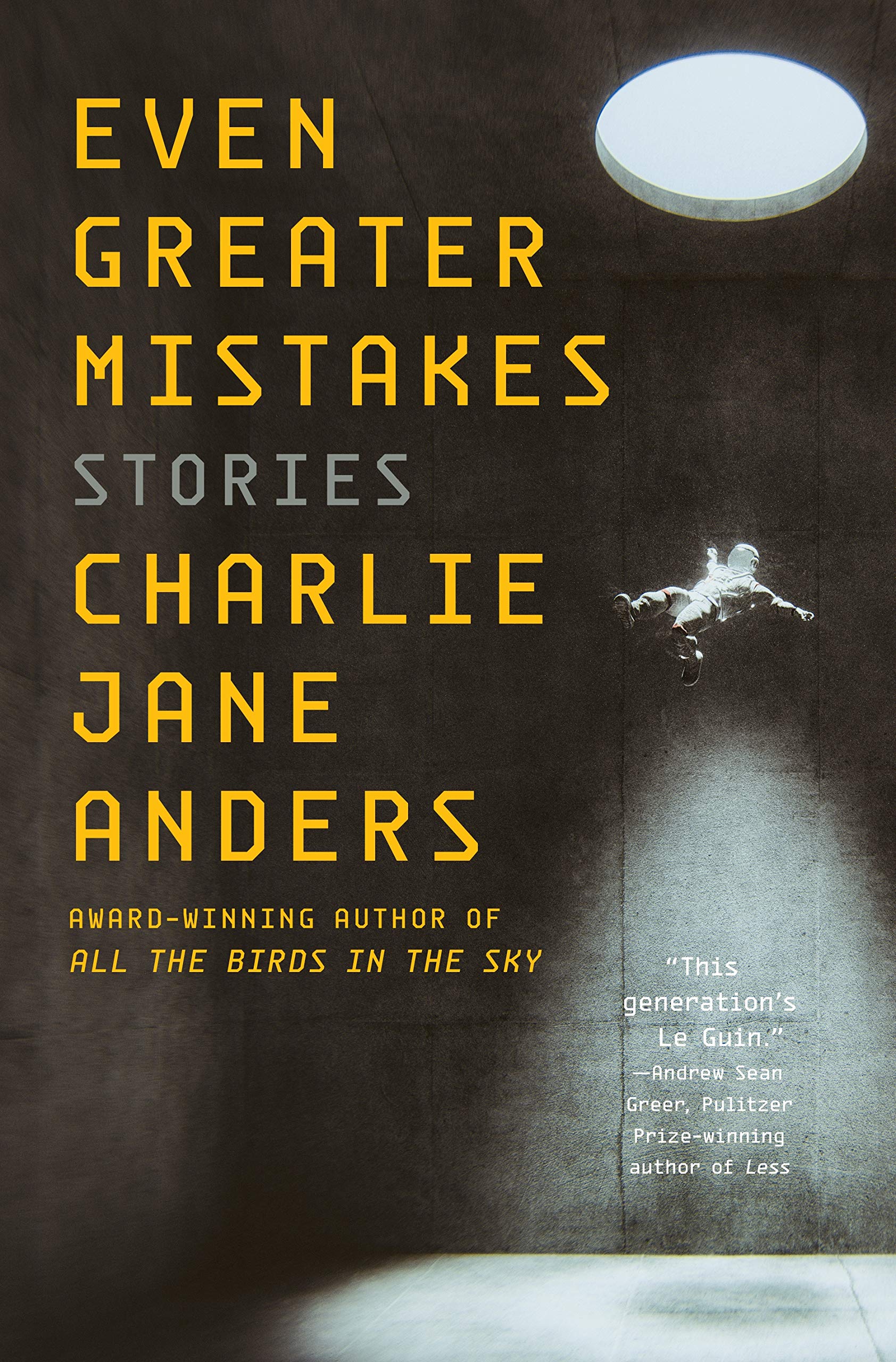 All of that makes it ironic that the first (alphabetical) title on my 2021 recommended list is The Wisdom of Crowds by Joe Abercrombie (Orion). It closes off a second trilogy set in his First Law world with a bloody, gritty, examination of politics and the mob. The Art of Space Travel and Other Stories by Nina Allan (Titan) is a first collection, of characteristically thoughtful stories; Allan remains a writer whose work should be much more widely known. Another first collection, Even Greater Mistakes: Stories, Charlie Jane Anders (Tor) couldn’t be more different: Anders has a thoroughly 2021 ironic knowingness about the tropes of SF and fantasy, which she plunders with abandon.
All of that makes it ironic that the first (alphabetical) title on my 2021 recommended list is The Wisdom of Crowds by Joe Abercrombie (Orion). It closes off a second trilogy set in his First Law world with a bloody, gritty, examination of politics and the mob. The Art of Space Travel and Other Stories by Nina Allan (Titan) is a first collection, of characteristically thoughtful stories; Allan remains a writer whose work should be much more widely known. Another first collection, Even Greater Mistakes: Stories, Charlie Jane Anders (Tor) couldn’t be more different: Anders has a thoroughly 2021 ironic knowingness about the tropes of SF and fantasy, which she plunders with abandon.
The Actual Star by Monica Byrne (HarperCollins) was, for me, one of the books of the year: ambitious, encompassing, superbly written, and surpassing even the achievement of Byrne’s The Girl in the Road. It was a story – or rather, a linked set of stories – in which you could become immersed for days. Spirits Abroad: Stories by Zen Cho (Small Beer) was a greatly expanded version of the collection that won the Crawford Award in 2015. Myth and the everyday cohabit in these often very funny tales. The author’s novel Black Water Sister (Ace) was also impressive, taking Malaysian folklore to some very unexpected places. A Master of Djinn by P. Djèlí Clark (Tor) more that fulfils the promise of his earlier stories, depicting a vivid steampunk (djinn-driven) Cairo.
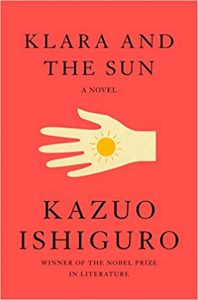 The Best of Elizabeth Hand (Subterranean) is a book especially useful in the case of this author, who has done so much of her best work at novella and novelette length. The selection of works is judicious, and also finds space for shorter, spikier pieces like “Ghost Light” and “The Bacchae”. Many of the stories here, such as “Last Summer at Mars Hill”, “The Maiden Flight of McCauley’s Bellerophon”, and “Illyria” feel like they are already becoming canonical. Klara and the Sun by Kazuo Ishiguro (Faber) is, in a weird way, a companion to Ian McEwan’s Machines Like Me (2019): a “literary fiction” author ventures into SF by telling a story of robot/android companionship for humans. But Ishiguro’s work is by far the more assured and thoughtful, with the reader expected – as in Never Let Me Go – to understand what the narrator is not telling us, and why. Alaya Dawn Johnson’s Reconstruction (Small Beer) was another fine collection in a year that had many of them, bringing together stories with a wide range of settings but a common theme identified by the title: what happens after the worst happens.
The Best of Elizabeth Hand (Subterranean) is a book especially useful in the case of this author, who has done so much of her best work at novella and novelette length. The selection of works is judicious, and also finds space for shorter, spikier pieces like “Ghost Light” and “The Bacchae”. Many of the stories here, such as “Last Summer at Mars Hill”, “The Maiden Flight of McCauley’s Bellerophon”, and “Illyria” feel like they are already becoming canonical. Klara and the Sun by Kazuo Ishiguro (Faber) is, in a weird way, a companion to Ian McEwan’s Machines Like Me (2019): a “literary fiction” author ventures into SF by telling a story of robot/android companionship for humans. But Ishiguro’s work is by far the more assured and thoughtful, with the reader expected – as in Never Let Me Go – to understand what the narrator is not telling us, and why. Alaya Dawn Johnson’s Reconstruction (Small Beer) was another fine collection in a year that had many of them, bringing together stories with a wide range of settings but a common theme identified by the title: what happens after the worst happens.
A Desolation Called Peace by Arkady Martine (Tor) was a follow-up to the Hugo-winning A Memory Called Empire, and shared the virtues of its predecessor: diplomatic intrigue, tension, and thoughtful depictions of different cultures. The Last Graduate by Naomi Novik (Del Rey) was also a sequel (to last year’s A Deadly Education) and it continued the first book’s enjoyable ransacking of fantasy university tropes. Noor by Nnedi Okorafor (DAW) took a hard look at how capitalism might afflict a future Nigeria and a not-entirely-human protagonist. Perhaps the Stars by Ada Palmer (Tor) closed down the Terra Ignota series in spectacular fashion: as a whole, it’s clearly one of the most ambitious and successful series in recent years. We Are Satellites by Sarah Pinsker (Berkley) was determinedly small-scale, but none the worse for that. It focuses on a single family riding a societal change: a new brain implant that radically reshapes the human capacity for attention. In this case, the narrowness of focus made this a more human story than much of SF.
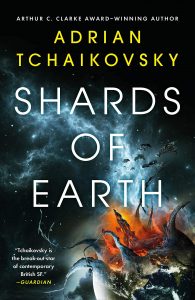 Purgatory Mount by Adam Roberts (Orion) was characteristically grand in its aspirations: a re-visioning of Dante was only a part of its scope, along with a slickly-done technothriller plot. The Unraveling by Benjamin Rosenbaum (Erewhon) was as ambitious a first novel as one might have hoped for from Rosenbaum’s short fiction: gender, society, the economy, and just about everything else are subject to change and debate in Rosenbaum’s world. It’s one of those books that almost has too many ideas. Shards of Earth by Adrian Tchaikovsky (Orion) is a widescreen space opera that won’t disappoint anyone who enjoyed Children of Time; it’s the first volume in a sequence, and there are any number of intriguing directions in which it could go.
Purgatory Mount by Adam Roberts (Orion) was characteristically grand in its aspirations: a re-visioning of Dante was only a part of its scope, along with a slickly-done technothriller plot. The Unraveling by Benjamin Rosenbaum (Erewhon) was as ambitious a first novel as one might have hoped for from Rosenbaum’s short fiction: gender, society, the economy, and just about everything else are subject to change and debate in Rosenbaum’s world. It’s one of those books that almost has too many ideas. Shards of Earth by Adrian Tchaikovsky (Orion) is a widescreen space opera that won’t disappoint anyone who enjoyed Children of Time; it’s the first volume in a sequence, and there are any number of intriguing directions in which it could go.
The Memory Theater by Karin Tidbeck (Pantheon) was an intriguing world-hopping fantasy that crammed a huge amount into relatively few pages. The Best of Harry Turtledove (Subterranean) assembled a wide range of work from the author’s long career. The easy thing to say about Turtledove is that his expertise as a historian is evident in his fiction. What this collection makes clear is just how many different kinds of use that expertise can be put to. Fugitive Telemetry by Martha Wells (Tor) was a brief but sparky singleton in the author’s Murderbot chronicles.
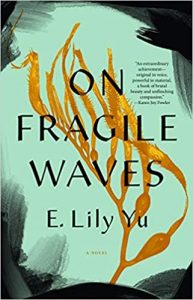 Another Subterranean Press compilation, The Best of Walter Jon Williams, collected a wide range of stories from an undervalued author. Works such as “Dinosaurs”, “Surfacing”, “The Green Leopard Plague”, and “Wall, Stone, Craft” show just how good Williams is at his best. Never Have I Ever by Isabel Yap (Small Beer) was another debut collection, focussing particularly on the immigrant experience and how stories grow around it. And finally, On Fragile Waves by E Lily Yu (Erewhon) was a story of refugees made all the more powerful by the news from Afghanistan this year.
Another Subterranean Press compilation, The Best of Walter Jon Williams, collected a wide range of stories from an undervalued author. Works such as “Dinosaurs”, “Surfacing”, “The Green Leopard Plague”, and “Wall, Stone, Craft” show just how good Williams is at his best. Never Have I Ever by Isabel Yap (Small Beer) was another debut collection, focussing particularly on the immigrant experience and how stories grow around it. And finally, On Fragile Waves by E Lily Yu (Erewhon) was a story of refugees made all the more powerful by the news from Afghanistan this year.
Ten books of the year:
Even Greater Mistakes: Stories, Charlie Jane Anders (Tor)
The Actual Star, Monica Byrne (HarperCollins)
Spirits Abroad: Stories, Zen Cho (Small Beer)
The Best of Elizabeth Hand, Elizabeth Hand (Subterranean)
Klara and the Sun, Kazuo Ishiguro (Faber)
A Desolation Called Peace, Arkady Martine (Tor)
Perhaps the Stars, Ada Palmer (Tor)
We Are Satellites, Sarah Pinsker (Berkley)
The Unraveling, Benjamin Rosenbaum (Erewhon)
Shards of Earth, Adrian Tchaikovsky (Orion)
This review and more like it in the February 2022 issue of Locus.
 While you are here, please take a moment to support Locus with a one-time or recurring donation. We rely on reader donations to keep the magazine and site going, and would like to keep the site paywall free, but WE NEED YOUR FINANCIAL SUPPORT to continue quality coverage of the science fiction and fantasy field.
While you are here, please take a moment to support Locus with a one-time or recurring donation. We rely on reader donations to keep the magazine and site going, and would like to keep the site paywall free, but WE NEED YOUR FINANCIAL SUPPORT to continue quality coverage of the science fiction and fantasy field.
©Locus Magazine. Copyrighted material may not be republished without permission of LSFF.



